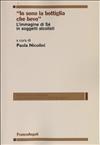
L'immagine di sé in soggetti alcolisti
cod. 231.1.6

L'immagine di sé in soggetti alcolisti
cod. 231.1.6

A peculiar gap can be noted in experimental phenomenology literature. Among all the authors who are cited as indispensable sources and refer-ences, Edmund Husserl, the founder of phenomenology, is hardly ever men-tioned. Savardi and Bianchi’s research on the relationship of opposition provides an opportunity for reflecting on some of the possible reasons for this omission. Indeed, while their research opens up a new field of investiga-tion for experimental phenomenology, these authors seem to implicitly re-vive Husserl's main themes, in scientific approach, method, as well as re-sults pertaining to the specific subject of opposition. The analysis of the af-finities between pure and experimental phenomenology is proposed as an encouragement to rekindle the all-too-abruptly-interrupted relationship be-tween the method’s basic arguments and its scientific developments. The lack of dialogue between the two approaches to reading phenomenology is apparently due more to historical and cultural causes than to sound theoreti-cal reasons.

Per una scienza delle Relazioni in Psicologia
cod. 1240.211

Temi per un confronto
cod. 2000.565